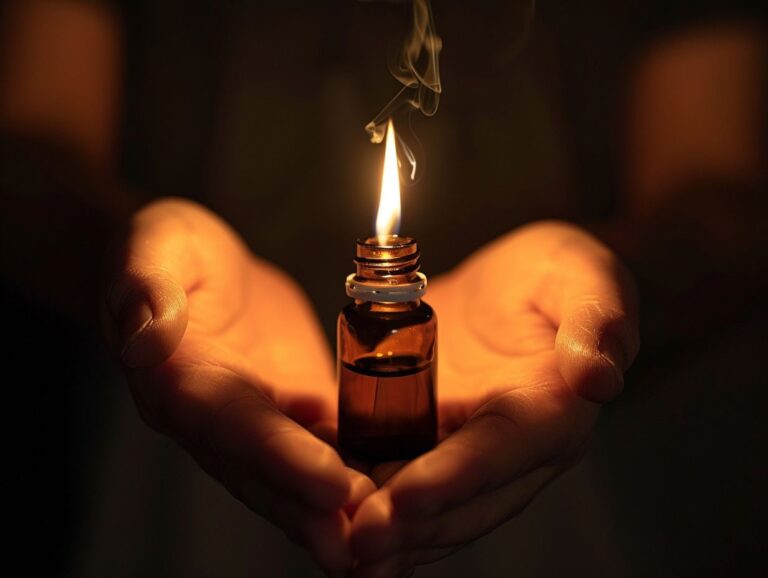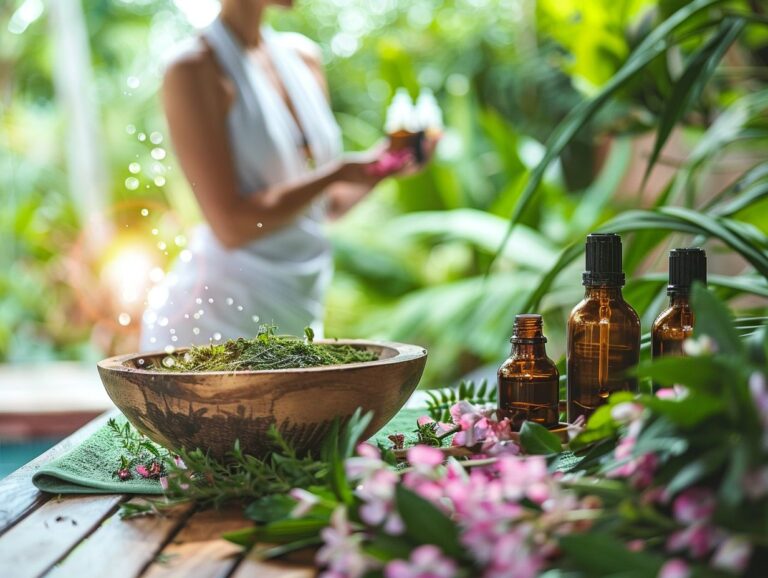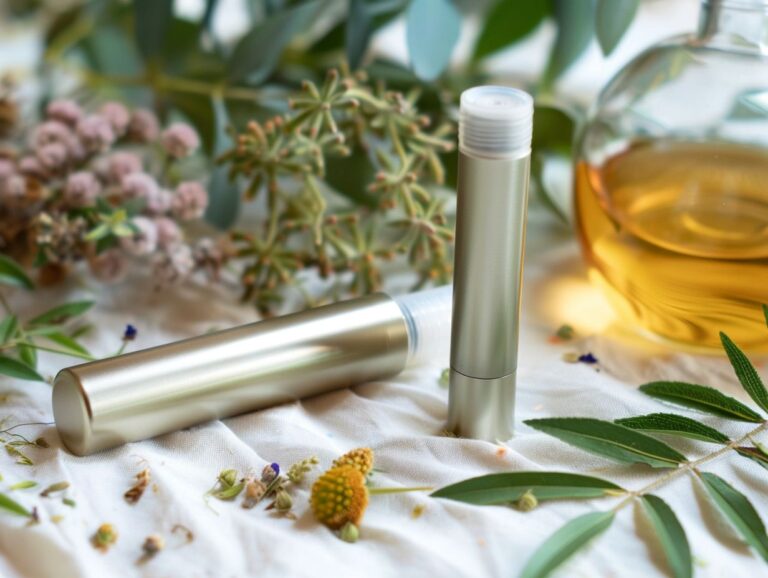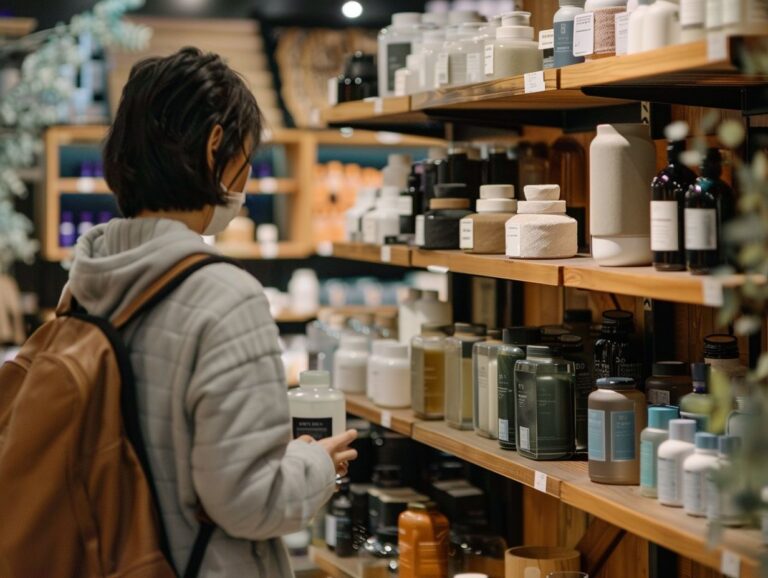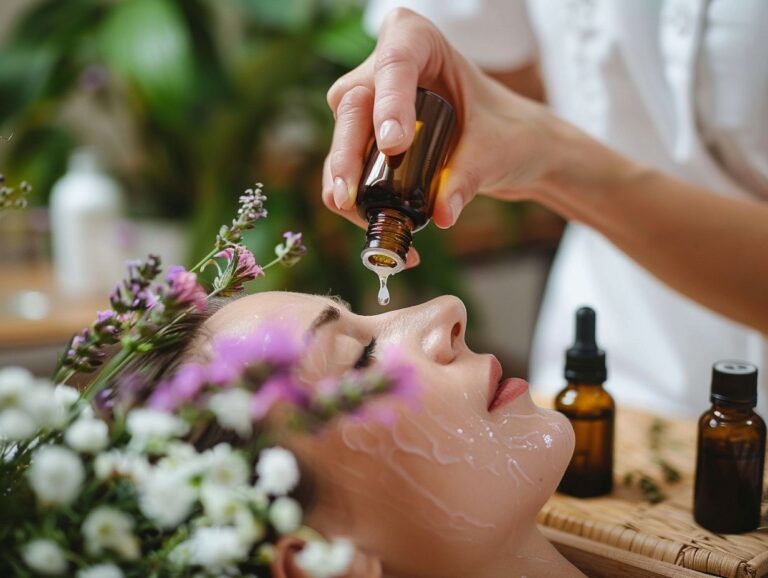How Does Aromatherapy Make You Feel
Have you ever wondered how a simple scent can have such a powerful effect on your mood and well-being?
Aromatherapy, the practice of using essential oils to improve physical, mental, and emotional health, has been used for centuries to promote relaxation, reduce stress, and enhance overall wellness.
Explore how aromatherapy helps emotions today.
In this article, we will explore the fascinating world of aromatherapy, including how it works, the benefits it offers, different essential oils and their effects, and practical ways to incorporate aromatherapy into your daily life.
Get ready to discover the transformative power of scent!
Key Takeaways:
What Is Aromatherapy?
Aromatherapy is a holistic therapy that uses essential oils extracted from plants to promote health and well-being through various applications and techniques.
Originating from ancient civilizations such as the Egyptians, Greeks, and Chinese, aromatherapy has deep roots in traditional medicinal practices that believed in the power of natural remedies to heal the body and mind. The principles of aromatherapy revolve around the idea that inhaling the aroma of essential oils can stimulate brain functions, influence emotions, and even trigger certain physiological responses. These oils, extracted through methods like distillation or cold pressing, are highly concentrated and carry the pure essence of the plant they are derived from. Essential oils are the core of aromatherapy, known for their therapeutic properties which can help alleviate stress, anxiety, pain, boost relaxation, and improve sleep quality.
How Does Aromatherapy Work?
Aromatherapy works by utilizing the aromatic properties of essential oils to stimulate the limbic system in the brain, which regulates emotions, hormones, and various bodily functions.
The limbic system, often referred to as the ’emotional brain,’ plays a crucial role in processing memories, emotions, and stress responses. When inhaling essential oils, the molecules are able to directly impact this area, triggering a cascade of neurological signals that can lead to profound relaxation and emotional balance. One key aspect of this process is the release of neurotransmitters such as serotonin and endorphins, which are known to promote feelings of happiness and well-being.
What Are Essential Oils?
Essential oils are concentrated extracts derived from plants, known for their potent aromatic properties and therapeutic benefits when used in skincare, inhalation, or massage therapies.
There is a wide variety of plants used for extracting essential oils, each with its unique set of benefits. Some common plants include lavender, tea tree, peppermint, and eucalyptus, known for their soothing, anti-inflammatory, and antibacterial properties.
Essential oils offer a diverse range of health benefits such as reducing stress, improving sleep quality, boosting mood, and even helping with headaches and allergies.
These oils can be incorporated into skincare routines through dilution and topical application, inhaled directly or through diffusers for aromatherapy, or used in massages to relax muscles and promote overall well-being.
How Are Essential Oils Extracted?
Essential oils are typically extracted from plants through methods such as steam distillation, cold pressing, or solvent extraction, ensuring the preservation of their beneficial properties for skincare and therapeutic use.
Among these extraction methods, steam distillation is one of the most common techniques used to obtain essential oils. In this process, steam is passed through the plant material, causing the essential oils to evaporate. The steam-oil mixture is then condensed, separating the oil from the water.
Cold pressing, on the other hand, is primarily used for citrus fruits like oranges and lemons, where the peel is physically pressed to extract the oils.
What Are the Different Methods of Using Essential Oils?
Essential oils can be used through various methods, including inhalation, topical application on the skin, adding them to massage oils, or incorporating them into skincare products for their therapeutic effects.
One of the most common ways to benefit from essential oils is through inhalation, which can be done by diffusing the oils in the air, inhaling them directly from the bottle, or adding a few drops to a bowl of hot water for steam inhalation.
Topical application involves diluting essential oils with carrier oils such as coconut or almond oil and applying the mixture to the skin for absorption. Many individuals also enjoy incorporating essential oils into their skincare routines by adding a drop or two to their moisturizers, serums, or masks.
What Are the Benefits of Aromatherapy?
Aromatherapy offers a range of benefits for overall health and well-being, including stress reduction, improved sleep quality, enhanced mood and energy levels, relief from headaches and pain, and relaxation of mind and body.
Studies have shown that certain essential oils like lavender and chamomile can have a calming effect on the nervous system, helping to reduce feelings of anxiety and stress. In fact, a study published in the Journal of Alternative and Complementary Medicine found that inhaling lavender essential oil significantly reduced anxiety levels in participants.
Aromatherapy has been found to improve sleep quality by promoting relaxation and reducing insomnia symptoms. Research from the International Journal of Neuroscience suggests that diffusing oils such as jasmine or sandalwood before bedtime can lead to increased sleep efficiency and overall better quality of rest.
The uplifting scents of citrus oils like lemon and orange have been linked to boosting mood and enhancing energy levels. A study in the Journal of Experimental Botany revealed that inhaling citrus essential oils can stimulate the brain’s limbic system, responsible for emotions and memory, resulting in improved mood.
The analgesic properties of essential oils such as peppermint and eucalyptus have been found to help alleviate pain and headaches. Research conducted at the University of Maryland Medical Center indicates that applying peppermint oil topically can reduce headache intensity and frequency.
The practice of aromatherapy can aid in overall relaxation of the mind and body, promoting a sense of calm and well-being. A meta-analysis published in the European Journal of Integrative Medicine highlighted the positive effects of aromatherapy on reducing stress and promoting relaxation, leading to improved mental clarity and emotional balance.
Reduces Stress and Anxiety
Aromatherapy has been shown to effectively reduce stress and anxiety levels through the inhalation of calming essential oils, promoting relaxation and a sense of well-being.
Among the specific essential oils renowned for their stress-relieving properties are Lavender, known for its calming aroma that helps combat nervous tension, and Chamomile, which is soothing and aids in relaxation.
When these essential oils are inhaled, they trigger the limbic system in the brain, responsible for regulating emotions and memory, leading to a tranquil state of mind.
Aromatherapy techniques can be personalized to target individual needs, with diffusing oils like Bergamot in the workspace to reduce stress or using Ylang Ylang during a massage for relaxation, providing tailored methods for alleviating anxiety symptoms effectively.
Improves Sleep Quality
Aromatherapy is beneficial in improving sleep quality by using soothing essential oils that help relax the mind and body, creating an optimal environment for restful sleep.
Some of the essential oils commonly recommended for promoting better sleep include Lavender, Chamomile, and Marjoram. These oils are known for their calming and sedative properties, which can help reduce stress and anxiety, two common culprits of sleep disturbances.
Through the use of aromatherapy, individuals can address sleep disorders such as insomnia, restless sleep, or difficulty falling asleep. The aroma of these essential oils can trigger the brain to release chemicals that promote relaxation and induce a state of tranquility, setting the stage for a peaceful night’s rest.
Creating a calming bedtime routine with aromatherapy involves incorporating these essential oils into diffusers or applying them topically through massage or bath rituals. By establishing a consistent bedtime ritual that includes these soothing scents, individuals can signal to their bodies that it’s time to unwind and prepare for a restorative sleep cycle.
Boosts Mood and Energy
Aromatherapy uplifts mood and boosts energy levels through the invigorating scents of essential oils, promoting a sense of vitality and well-being.
Some essential oils commonly used for enhancing energy and improving mood include peppermint, citrus, and rosemary. Peppermint oil is known for its refreshing and stimulating properties, while citrus scents can uplift and invigorate the senses. Rosemary oil is often used to promote mental clarity and focus.
One effective way to incorporate aromatherapy into your daily routine is by diffusing essential oils using a diffuser. Inhaling the aroma of these oils can have a direct impact on your mood and energy levels.
Another method is to create your own energizing blend by mixing a few drops of different essential oils. This personalized blend can be used in a room spray or added to a carrier oil for a stimulating massage.
Whether you start your day with an energizing citrus scent or use a calming lavender oil before bedtime, integrating aromatherapy practices into your daily life can greatly enhance your overall well-being and vitality.
Relieves Headaches and Migraines
Aromatherapy has shown efficacy in relieving headaches and migraines by using essential oils with analgesic properties that help reduce pain and induce relaxation.
In terms of essential oils for headaches, peppermint oil is a popular choice due to its cooling effect that can help soothe head pain. Similarly, lavender oil is known for its calming properties, making it effective in reducing stress-related headaches. Eucalyptus oil is another option, with its anti-inflammatory effects that can alleviate sinus headaches. Using these oils in massage techniques by diluting them with a carrier oil and gently massaging the temples and neck can provide relief.
For aromatherapy blends to manage migraine symptoms, consider combining peppermint, lavender, and chamomile oils for a soothing and pain-relieving blend. Diffusing these oils in a room or inhaling them directly can help combat migraine triggers and symptoms. Creating a calming atmosphere with soft lighting and gentle music can enhance the effects of the aromatherapy treatment.
Eases Pain and Inflammation
Aromatherapy offers a natural and safe approach to easing pain and inflammation, with essential oils known for their anti-inflammatory and analgesic properties.
When using essential oils for pain management, it’s crucial to understand their diverse benefits. For instance, oils like lavender and peppermint are praised for their soothing effects on sore muscles, while eucalyptus and ginger are valued for their ability to reduce swelling. Frankincense and rosemary are also popular choices due to their analgesic properties.
Incorporating these oils into your aromatherapy routine can provide relief from discomfort in a gentle yet effective manner.
What Are the Different Essential Oils and Their Effects?
Different essential oils offer unique effects, such as lavender for calming and relaxation, peppermint for energy and invigoration, eucalyptus for soothing and decongesting, lemon for uplifting and refreshing, and tea tree for antimicrobial and healing properties.
These essential oils are not just known for their pleasant fragrances, but their therapeutic properties extend to various health benefits. Lavender, renowned for its calming scent, is often used to reduce stress and improve sleep quality. Peppermint, with its energizing aroma, can help alleviate headaches and boost mental alertness. Eucalyptus oil is commonly used in aromatherapy to relieve respiratory issues like congestion and coughs. Lemon oil is a great mood booster and can even be used for disinfecting surfaces. Tea tree oil’s antiseptic qualities make it a popular choice for treating skin conditions like acne and minor cuts.
Lavender – Calming and Relaxing
Lavender essential oil is renowned for its calming and relaxing properties, making it an ideal choice for reducing stress, anxiety, and promoting overall relaxation.
One of the main ways lavender oil works its magic is through its ability to calm the mind and body by soothing the nervous system. The gentle floral aroma of lavender has been shown to have a positive impact on mood, promoting feelings of peace and tranquility.
To incorporate lavender into your relaxation practices, you can add a few drops of lavender essential oil to a warm bath for a luxurious soak, or diffuse it in your bedroom to create a calming atmosphere before bedtime.
For those interested in creating their own custom aromatherapy blends, lavender oil blends well with a variety of other essential oils such as citrus oils like lemon or mint oils like peppermint, allowing you to personalize your relaxation experience to suit your preferences.
Peppermint – Energizing and Invigorating
Peppermint essential oil is known for its energizing and invigorating properties, helping boost mental clarity, focus, and energy levels.
Many turn to peppermint oil as a natural remedy to combat fatigue and enhance productivity. Its refreshing scent acts as a stimulant for the mind, promoting alertness and sharpening concentration. An easy way to harness these benefits is through aromatherapy. Simply add a few drops of peppermint essential oil to a diffuser or inhale directly from the bottle to feel an instant sense of revitalization. You can also incorporate it into your daily routine by blending it with other oils like eucalyptus and bergamot for a custom energizing blend.
Eucalyptus – Soothing and Decongesting
Eucalyptus essential oil offers soothing and decongesting properties, making it a popular choice for respiratory relief and promoting clear breathing.
Regular use of eucalyptus oil can help to open up the airways, making it easier to breathe during periods of congestion or respiratory distress.
- One effective technique for decongestion is to add a few drops of eucalyptus oil to a bowl of hot water and inhale the steam. This can help to loosen mucus and clear the sinuses.
- For a refreshing and invigorating atmosphere, try blending eucalyptus oil with peppermint and lemon essential oils. This combination can help uplift the mood and promote a sense of clarity.
Lemon – Uplifting and Refreshing
Lemon essential oil is uplifting and refreshing, known for its invigorating citrus scent that enhances mood, promotes mental clarity, and freshens the air.
The crisp, zesty aroma of lemon oil can be a powerful tool for reviving the mind and body, especially during moments of fatigue or stress. It has been shown to improve concentration and boost energy levels, making it an ideal choice for jump-starting the day or overcoming mid-afternoon slumps.
One popular way to incorporate the benefits of lemon oil into your routine is through diffusing. Adding a few drops to a diffuser can instantly uplift the atmosphere in your home or workspace, creating a vibrant and inviting environment.
Add a few drops of lemon oil to a relaxing bath to invigorate your senses and rejuvenate your spirits. The citrusy fragrance can awaken your senses and provide a refreshing pick-me-up after a long day.
Tea Tree – Antimicrobial and Healing
Tea tree essential oil is valued for its antimicrobial and healing properties, making it a versatile choice for skincare, wound care, and natural cleaning solutions.
Tea tree oil, derived from the leaves of the Melaleuca alternifolia plant, is known for its powerful antimicrobial benefits. Its natural compounds, such as terpinen-4-ol, help combat bacteria, viruses, and fungi, making it a popular choice for treating acne, eczema, and wounds. Tea tree oil is also used in aromatherapy blends to support the immune system and promote respiratory health. Its disinfectant properties make it an effective ingredient in DIY cleaning products for purifying surfaces and air. The oil’s antiseptic qualities, coupled with its soothing properties, make it a must-have in natural health and wellness routines.
How Can Aromatherapy Be Used in Daily Life?
Aromatherapy can be seamlessly integrated into daily life by inhaling essential oils, applying them topically, using diffusers, adding to baths or showers, and incorporating them into skincare and haircare routines.
With their calming or energizing properties, essential oils can find a place in different aspects of your day, helping you relax before sleep or stay focused during work hours. It is important to dilute essential oils properly before applying them on the skin to prevent irritation.
You can create your own personalized blends for various purposes, such as enhancing mood, promoting relaxation, or alleviating headaches. Easily adaptable, aromatherapy can be tailored to your specific needs and preferences, making it a versatile tool for well-being improvement.
Inhaling Essential Oils
Inhaling essential oils is a common method in aromatherapy, where the aromatic molecules are inhaled through the nose, reaching the limbic system and promoting various physiological and psychological effects.
One of the key advantages of inhaling essential oils is the immediate and direct impact they have on the brain and emotions. The rapid absorption of these aromatic compounds triggers responses in the limbic system, which is responsible for emotions, memory, and behavior.
For example, inhaling lavender oil can help reduce stress and anxiety levels due to its calming properties. On the other hand, peppermint oil inhalation can boost energy and focus, making it ideal for improving concentration.
Specific inhalation techniques, such as using a diffuser, inhaling from a bowl of hot water, or applying a few drops to a tissue, can target various health concerns effectively.
Topical Application of Essential Oils
Topical application of essential oils involves diluting them with carrier oils and applying them to the skin, allowing for absorption and localized therapeutic effects.
It is essential to dilute essential oils before applying them to the skin to prevent potential irritation or sensitization. A common dilution ratio is 2-3 drops of essential oil per teaspoon of carrier oil. Popular carrier oils include coconut, jojoba, and almond oil.
When using essential oils topically, patch testing is crucial to check for any adverse reactions. Apply a small amount of diluted oil to a small area of skin and wait 24 hours to observe any negative responses before full application.
- Sensitive areas like the face and mucous membranes should be avoided or use highly diluted blends to prevent irritation or adverse reactions.
For skincare, lavender and tea tree oils offer antiseptic and anti-inflammatory properties, helping with acne, eczema, and minor skin irritations.
Peppermint and eucalyptus oils can be used for pain relief due to their analgesic and anti-inflammatory properties. Dilute with a carrier oil and massage into sore muscles or joints for relief.
For relaxation, blends of chamomile and ylang-ylang create a calming atmosphere, perfect for unwinding after a long day. Add a few drops to a diffuser or mix with a carrier oil for a soothing massage.
Using Essential Oils in a Diffuser
Using essential oils in a diffuser disperses the aromatic molecules into the air, creating a soothing or invigorating atmosphere depending on the oils..
Essential oil diffusers not only help in elevating the ambiance of a room but also offer various health benefits. The therapeutic properties of essential oils can positively impact one’s mood, alleviate stress, and even boost concentration. Diffusing essential oils can purify the air, removing airborne pathogens and enhancing overall air quality in a space.
Adding Essential Oils to Bath or Shower
Adding essential oils to a bath or shower transforms the experience into a therapeutic ritual, with the aromatic steam promoting relaxation, stress relief, and skin nourishment.
Not only does the scent uplift your mood, but the oils can also work wonders for your skin, leaving it feeling hydrated and revitalized. Essential oils like lavender can help soothe the mind and promote better sleep, while eucalyptus can clear the sinuses and invigorate the senses. Combining oils such as peppermint and citrus can create a refreshing and energizing blend for a morning shower.
Incorporating Essential Oils in Skincare and Haircare Products
Incorporating essential oils in skincare and haircare products enhances their therapeutic benefits, offering natural solutions for promoting healthy skin, hair, and overall well-being.
These potent extracts derived from plants carry a multitude of advantages for your beauty routine. Not only do they provide aromatic benefits, but they also possess various skin-healing and rejuvenating properties. By carefully selecting the right essential oils, you can customize your own DIY recipes to address specific skin concerns or hair issues. Whether you want to soothe dry skin, reduce acne breakouts, or strengthen your hair, essential oils can play a crucial role in achieving desired results.
Frequently Asked Questions
How Does Aromatherapy Make You Feel?
Aromatherapy is known for its ability to promote relaxation and improve mood, so it can make you feel calm, uplifted, and rejuvenated.
What Are the Benefits of Aromatherapy?
Aromatherapy can have various benefits, including reducing stress, easing anxiety and depression, improving sleep quality, relieving pain, and boosting immunity.
How Does Aromatherapy Work?
Aromatherapy works by using essential oils, which are natural plant extracts, to stimulate the olfactory system and trigger certain physiological responses in the body, such as relaxing the mind and body.
What Are Essential Oils and How Do They Make You Feel?
Essential oils are highly concentrated extracts from plants that have been used for centuries in traditional medicine and aromatherapy. They can make you feel calm, energized, or even reduce inflammation and pain.
Can Aromatherapy Help With Specific Emotions or Moods?
Yes, certain essential oils have been found to have specific effects on emotions and moods. For example, lavender can help with relaxation and sleep, while peppermint can boost alertness and energy.
How Can I Incorporate Aromatherapy into My Daily Routine?
Aromatherapy can be incorporated into your daily routine in various ways, such as using an essential oil diffuser, adding a few drops of essential oils to a warm bath, or creating a DIY aromatherapy massage oil.

